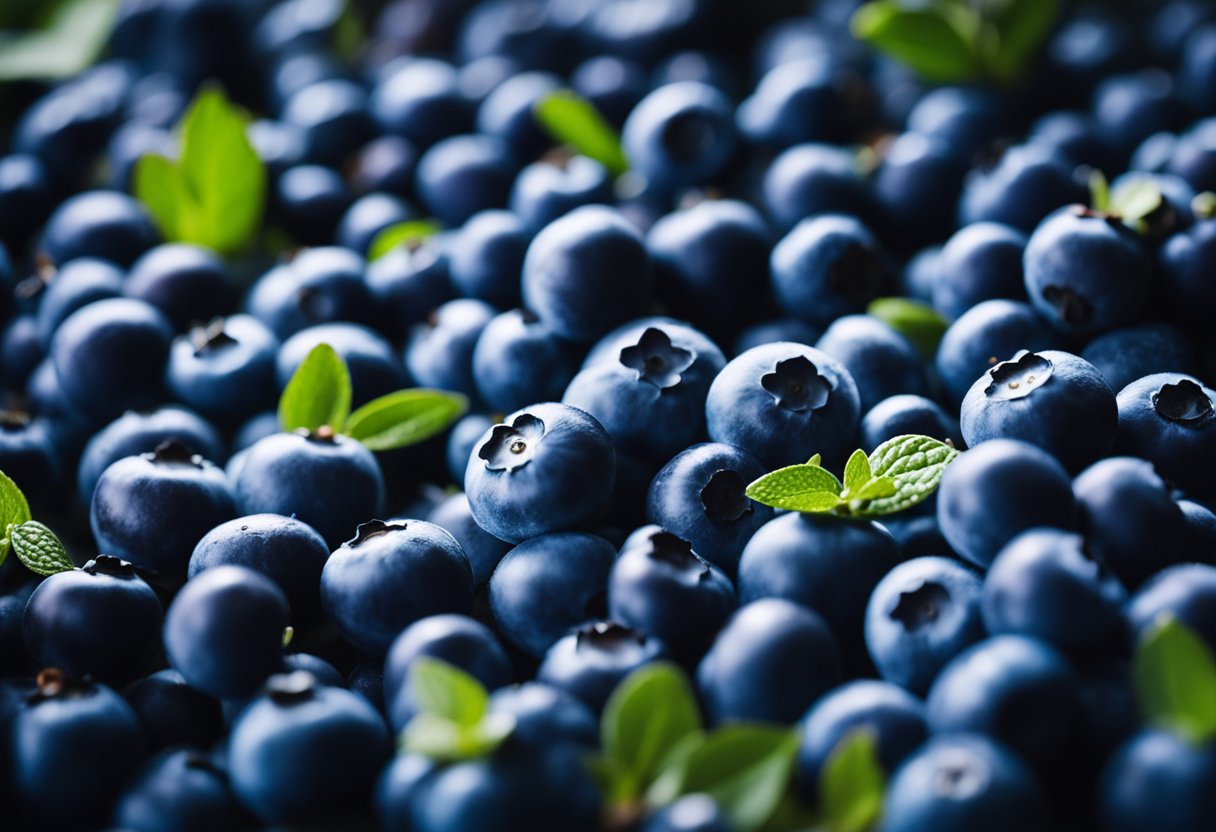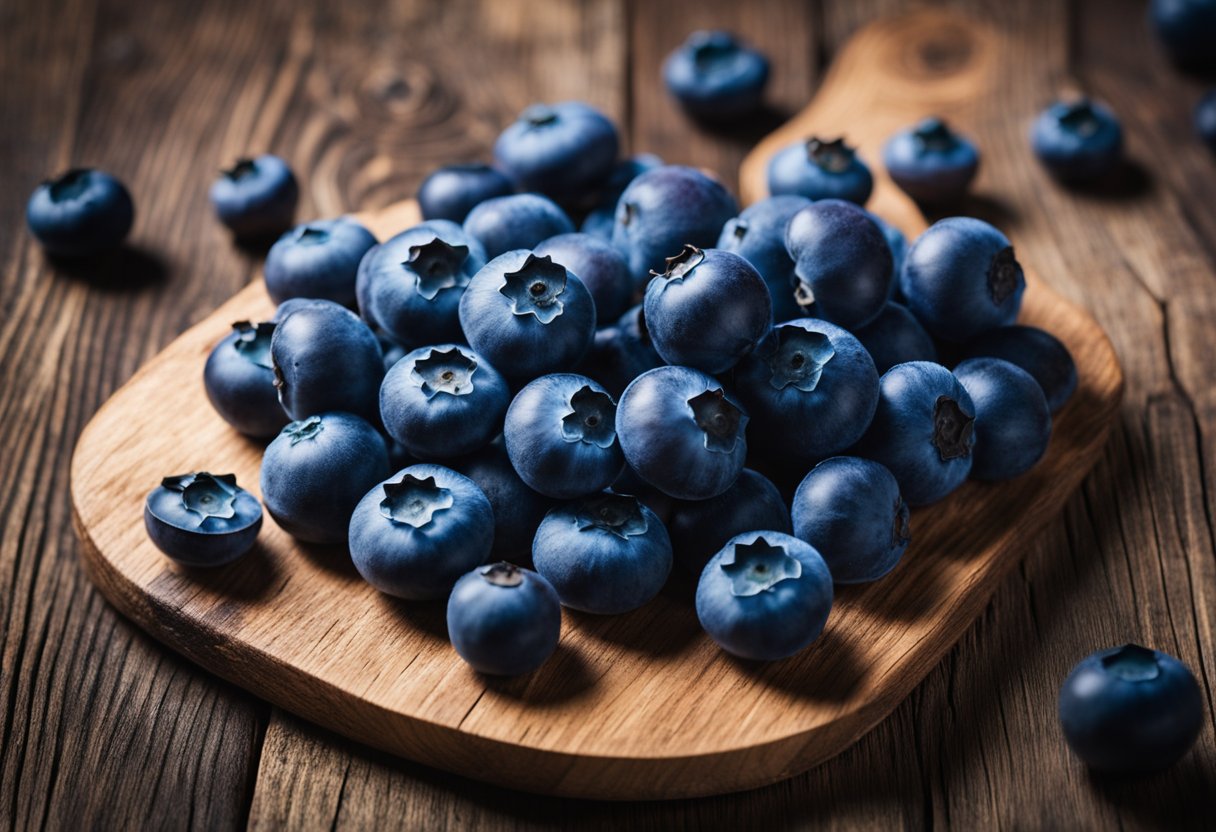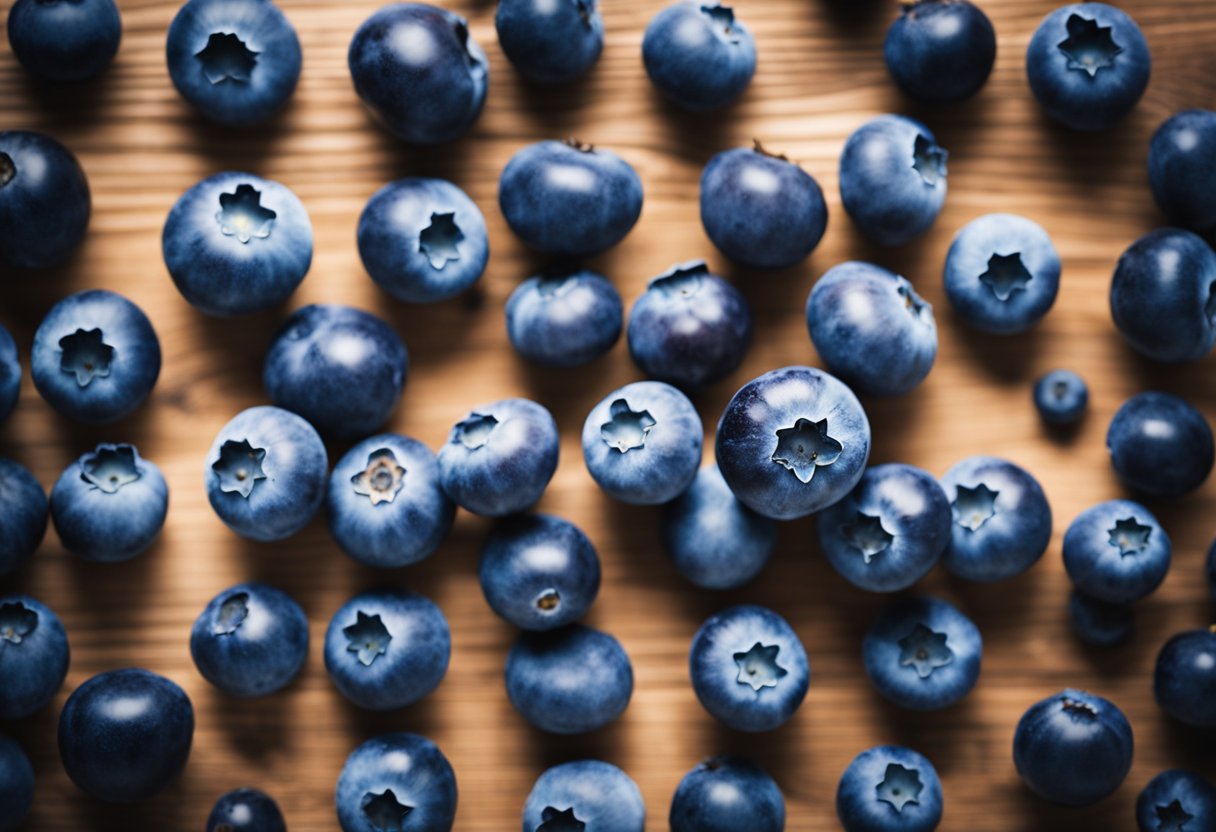Blueberries are a delicious and healthy fruit that are enjoyed by many people all over the world. They are packed with antioxidants, fiber, and vitamins, making them a great addition to any diet.
However, one question that people often have is how long do blueberries last? The answer to this question is not straightforward and depends on several factors, including when they were picked, how they are stored, and how fresh they are.

Understanding blueberries is important if you want to know how long they last. Blueberries are a highly perishable fruit that do not ripen once they are picked.
This means that they are best consumed when they are fresh. However, if you store them properly, you can extend their shelf life and enjoy them for a few more days.
In this article, I will provide you with all the information you need to know about blueberries, including how to identify fresh and bad blueberries, how to store them, and how to use them in cooking and baking.
Key Takeaways
- Blueberries are a highly perishable fruit that do not ripen once they are picked.
- To extend the shelf life of blueberries, it is important to store them properly.
- Blueberries are versatile and can be used in a variety of dishes, including desserts, salads, and smoothies.
Understanding Blueberries

Blueberries are a small, round, and sweet fruit that are known for their deep blue-black color and smooth skin.
They are typically plump and juicy when ripe, and they have a slightly sweet and tangy taste. Blueberries are packed with antioxidants, which can help to promote heart health and prevent cancer.
When it comes to the shelf life of blueberries, it is important to understand that they are highly perishable.
Fresh blueberries often do not have a “best before” or “use by” date, so it is important to use the date you purchase them as a guideline. At most, fresh blueberries can last two to three days on your counter.
To extend the shelf life of blueberries, it is best to store them in the refrigerator. If properly stored, blueberries can last up to two weeks in the refrigerator.
To keep blueberries fresh, it is important to store them in a container with a lid or in a resealable bag. This will help to prevent moisture from getting in and causing the blueberries to spoil.
Overall, blueberries are a delicious and nutritious fruit that can be enjoyed in a variety of ways. Whether you eat them fresh, frozen, or cooked, blueberries are a great addition to any meal or snack.
Identifying Fresh and Bad Blueberries
As a food enthusiast, I always want to make sure that the blueberries I consume are fresh and safe to eat. Here are some tips on how to identify fresh and bad blueberries:
- Appearance: Fresh blueberries should have a smooth skin, be plump, and have a uniform blue color. Bad blueberries, on the other hand, may have wrinkles, discoloration, or bruises. Moldy blueberries may also have a fuzzy white or grayish coating on their surface.
- Texture: Fresh blueberries should be firm, with a delicate skin that is not easily broken. Bad blueberries may be mushy, soft, or have a rotting smell. Bruised blueberries may also have a soft spot on their surface.
- Taste: Fresh blueberries should have a sweet and slightly tart taste. Bad blueberries may taste sour, bitter, or have no taste at all.
To ensure that you are buying fresh blueberries, check the container for any signs of mold, moisture, or damage.
When storing blueberries, make sure to keep them in a dry and cool place, away from direct sunlight. Blueberries can last up to 5-10 days in the refrigerator when stored properly.
If you have blueberries that are starting to go bad, you can still use them in recipes such as smoothies, baked goods, or sauces.
However, if the blueberries have become too mushy or moldy, it’s best to discard them to avoid any health risks.
In summary, identifying fresh and bad blueberries is essential to ensure that you are consuming safe and delicious fruit.
By following these tips, you can easily differentiate between fresh and bad blueberries and enjoy this nutritious fruit to its fullest.
How to Store Blueberries
As a food AI, I have learned that blueberries are a delicious and healthy fruit that can be enjoyed in a variety of ways.
However, they can spoil quickly if not stored properly. Here are some tips on how to store blueberries to make them last longer:
- Store blueberries in the fridge: Blueberries can last up to 2 weeks in the fridge if stored properly. Keep them in the crisper drawer, which is a more humid and cool environment than the rest of the fridge. This will help prevent the berries from drying out and becoming wrinkled.
- Use paper towels: Before storing blueberries in the fridge, make sure they are dry. You can rinse them in advance, under cool water in a colander, so long as you follow the next few steps to ensure they get dried off before storage. Transfer the dry berries to an airtight container lined with a layer of paper towels. Make sure to put them in a shallow layer so that the weight of the berries doesn’t crush the ones on the bottom. A layer no deeper than an inch and a half or so is fine.
- Use an airtight container: Blueberries are sensitive to moisture and can easily become moldy if exposed to too much humidity. Therefore, it is important to store them in an airtight container to prevent moisture from getting in. You can use a plastic clamshell container, a resealable bag, or a breathable container with a tight-fitting lid.
- Avoid plastic wrap: While it may seem like a good idea to wrap blueberries in plastic wrap to keep them fresh, this can actually cause them to spoil faster. Plastic wrap can trap moisture and prevent the berries from breathing, which can lead to mold growth.
- Store at room temperature only if needed: If you don’t have enough space in your fridge, you can store blueberries at room temperature for a short period of time. However, they will spoil faster this way, so it’s best to only store them at room temperature if you plan on eating them within a day or two.
Overall, storing blueberries properly can help extend their shelf life and keep them fresh for longer. By following these tips, you can enjoy delicious and healthy blueberries for up to 2 weeks!
Proper Washing of Blueberries
As someone who loves blueberries, I know how important it is to properly wash them before consuming. Here are a few tips on how to do it right:
- Start with clean hands. Always make sure your hands are clean before handling the blueberries.
- Use cool water. Place the blueberries in a colander and rinse them under cool, running water. Avoid using hot water as it can damage the berries.
- Don’t soak them. While it may be tempting to soak the berries, it’s not recommended. Blueberries are delicate and can easily become waterlogged, which can affect their taste and texture.
- Gently rinse them. Use your hands to gently rinse the berries, making sure to remove any dirt or debris. Be careful not to crush the berries.
- Dry them thoroughly. After rinsing, gently shake the colander to remove any excess water. Then, spread the blueberries out on a paper towel or clean dish towel and pat them dry with another towel.
By following these simple steps, you can ensure that your blueberries are properly washed and ready to eat.
Freezing Blueberries
As a berry lover, I always try to stock up on fresh blueberries when they are in season. But what do you do when you have too many blueberries and don’t want them to go bad? Freezing them is a great solution.
To freeze blueberries, start by sorting them and removing any stems or moldy berries. Soft berries won’t freeze well, so set those aside to use right away. Then, wash and dry the blueberries.
Next, you can choose to freeze them in a single layer on a baking sheet or in a freezer-safe container.
If you opt for the baking sheet method, be sure to spread the blueberries out in a single layer and freeze them for a few hours before transferring them to a container. This will prevent them from clumping together.
If you decide to use a container, make sure it is freezer-safe and airtight. You can also add a layer of parchment paper or plastic wrap between the blueberries to prevent them from sticking together.
Frozen blueberries can last up to 10 months in the freezer, but for the best quality, plan to use them within six months of freezing. When you’re ready to use them, simply thaw them in the refrigerator or at room temperature.
In summary, freezing blueberries is a simple and effective way to preserve them for later use. By following these tips, you can ensure that your frozen blueberries stay fresh and delicious for months to come.
Blueberries Shelf Life
Blueberries are a delicious fruit that can be enjoyed in many different ways, from baking them into pies and muffins to adding them to smoothies and salads.
However, it’s important to know how long blueberries last in order to ensure that they are still fresh and safe to eat.
The shelf life of blueberries depends on a few different factors, including their age and storage conditions.
When blueberries are picked, they are usually sold within a few days, and their shelf life can vary depending on how they are stored.
If you buy fresh blueberries from the grocery store, they can last for up to 2 weeks if stored properly.
To maximize the longevity of blueberries, it’s important to store them in a dry, cool place.
Blueberries can be stored in the refrigerator to help extend their shelf life, but they should be kept in a sealed container or plastic bag to prevent moisture from getting in and causing them to spoil.
When it comes to determining the best before or use by date for blueberries, it’s important to take into account the storage conditions.
If blueberries are stored in the refrigerator, they may last longer than if they are stored at room temperature.
However, it’s always a good idea to check the blueberries for signs of spoilage, such as mold or a sour smell, before consuming them.
In summary, the shelf life of blueberries can vary depending on their age and storage conditions.
To ensure that blueberries last as long as possible, they should be stored in a dry, cool place, such as the refrigerator, and checked regularly for signs of spoilage.
Blueberries in Cooking and Baking
I love cooking and baking with blueberries. They add a sweet and tangy flavor to many dishes. Blueberries are a versatile fruit that can be used in a variety of recipes, from breakfast to dessert.
One of my favorite ways to use blueberries is in blueberry muffins. They are easy to make and perfect for breakfast or a snack.
I like to use fresh blueberries in my muffins, but frozen blueberries work just as well. When using frozen blueberries, be sure to thaw them before adding them to the batter.
Blueberries can also be used in desserts like pies, cobblers, and crisps. They add a burst of flavor to these sweet treats.
When making a blueberry dessert, be sure to use ripe blueberries that are not too soft or mushy. You can also mix blueberries with other fruits like strawberries or raspberries for a delicious flavor combination.
When cooking with blueberries, it’s important to be careful not to overcook them. Overcooking can cause the blueberries to become mushy and lose their flavor.
When baking with blueberries, be sure to follow the recipe carefully and not to overmix the batter.
In summary, blueberries are a delicious and versatile fruit that can be used in a variety of recipes. They are perfect for breakfast, dessert, and everything in between.
When cooking and baking with blueberries, be sure to use fresh or frozen blueberries that are not too soft or mushy, and be careful not to overcook them.
Using Blueberries in Meals

Blueberries are a versatile fruit that can be used in a variety of meals. Here are some ideas on how to incorporate them into your diet:
Breakfast
Blueberries are a great addition to your breakfast routine. You can sprinkle them on top of your cereal or oatmeal, or mix them into your pancake or waffle batter. They also make a great topping for yogurt or cottage cheese.
Snacks
Fresh berries are a healthy and delicious snack option. You can enjoy them on their own, or pair them with some nuts or cheese for a more filling snack. You can also freeze them for a refreshing treat on a hot day.
Salads
Blueberries are a great addition to salads, adding a burst of sweetness to your greens. They pair well with spinach, arugula, or mixed greens. You can also add some nuts or cheese for some extra flavor and texture.
Smoothies
Blueberries are a popular ingredient in smoothies, adding both flavor and nutrition. You can blend them with some yogurt, milk, or juice for a refreshing and healthy drink. You can also add some protein powder or nut butter for a more filling smoothie.
Toppings
Blueberries make a great topping for desserts such as ice cream, cheesecake, or pie. You can also use them as a topping for your pancakes or French toast, or mix them into your muffin or cake batter for some added sweetness.
Overall, blueberries are a delicious and nutritious fruit that can be used in a variety of meals. They are a great source of antioxidants and are low in calories, making them a healthy addition to any diet.
Additional Tips for Blueberries

When it comes to storing blueberries, there are a few additional tips that can help prolong their shelf life and keep them fresh for longer.
Firstly, it’s important to check the blueberries for any signs of mold growth or bacteria before storing them.
If you notice any moldy or soft berries, remove them from the container and discard them to prevent the spread of bacteria.
It’s also important to check the container for any debris or stains before storing the blueberries. Make sure the container is clean and free of any dirt or debris that could cause the berries to spoil.
When storing blueberries, it’s best to keep them in their original packaging or transfer them to a container with a tight-fitting lid. This will help prevent moisture loss and keep the berries firm and fresh.
If you notice any leaking or stained berries, remove them from the container and discard them to prevent the spread of bacteria.
To prevent the blueberries from sticking together, try storing them in a single layer on a baking sheet or tray before transferring them to a container.
This will help prevent the berries from clumping together and sticking.
Finally, if you’re looking to enjoy blueberries with cream, it’s best to store the cream separately from the blueberries.
This will help prevent the cream from spoiling and prolong the shelf life of both the blueberries and the cream.
Overall, following these additional tips can help extend the shelf life of your blueberries and ensure that they stay fresh and delicious for as long as possible.
Also, check out some similar posts:
Frequently Asked Questions
How long do fresh blueberries last in the fridge?
Fresh blueberries can last up to 10 days in the fridge if they are kept in a sealed container or a plastic bag.
However, the shelf life of blueberries depends on when they were picked and how they are stored, so it’s best to consume them as soon as possible.
How long can unopened blueberries last?
Unopened blueberries that are stored in the fridge can last up to two weeks. It’s important to check the expiration date on the package before consuming them.
What is the shelf life of blueberries in water?
Blueberries stored in water can last up to two days in the fridge. However, it’s not recommended to store blueberries in water for an extended period of time as it can affect their texture and flavor.
How long do blueberries last at room temperature?
Blueberries are best stored in the fridge, but they can last up to two days at room temperature if they are kept in a cool, dry place.
However, it’s important to note that the shelf life of blueberries is shorter at room temperature compared to when they are stored in the fridge.
How long do organic blueberries last in the fridge?
Organic blueberries have the same shelf life as non-organic blueberries. They can last up to 10 days in the fridge if they are stored properly in a sealed container or a plastic bag.
How can you tell if blueberries have gone bad?
You can tell if blueberries have gone bad by checking for mold or a slimy texture. If the blueberries have a sour or off smell, it’s best to discard them.







